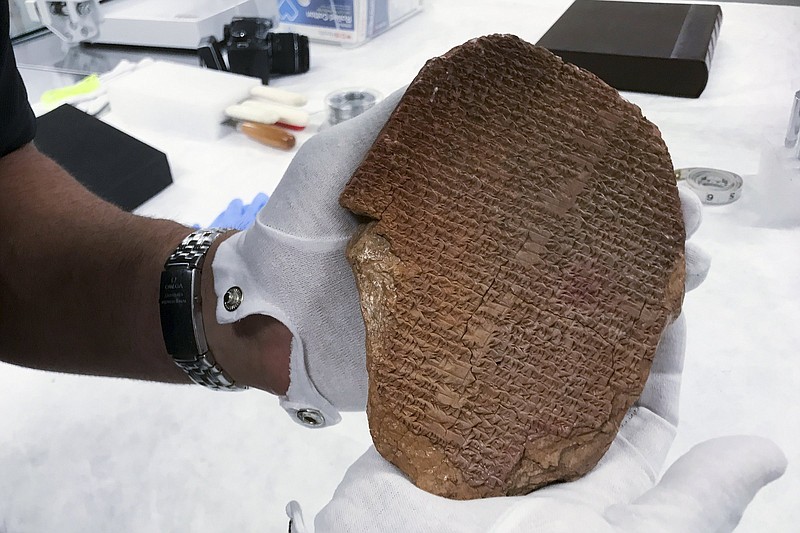WASHINGTON -- A 3,500-year-old clay tablet discovered in the ruins of the library of an ancient Mesopotamian king, then looted from an Iraqi museum 30 years ago, is finally headed back to Iraq.
The $1.7 million cuneiform clay tablet was found in 1853 as part of a 12-tablet collection in the rubble of the library of Assyrian King Ashurbanipal. Officials believe it was illegally imported into the United States in 2003, then sold to Hobby Lobby and eventually put on display in Hobby Lobby's Museum of the Bible in the nation's capital.
Federal agents with Homeland Security Investigations seized the tablet -- known as the Gilgamesh Dream tablet -- from the museum in September 2019. The Gilgamesh tablet is part of a section of a Sumerian poem from the Epic of Gilgamesh. It is one of the world's oldest works of literature, and one of the oldest religious texts.
Federal prosecutors in Brooklyn, N.Y., began a civil forfeiture court proceeding that resulted in a repatriation ceremony Thursday at the Smithsonian's National Museum of the American Indian with officials from Iraq.
Farreed Yasseen, the Iraqi ambassador to the U.S., said the looting of the museum in the 1990s hit Iraqis hard.
"The real core of what happened, though, is that people, individual people, did the right thing," he said. But there is much more to be done to preserve cultural heritage across the world. "Artifacts are still being stolen, they are being smuggled out."
Hassan Nadhem, the Iraqi minister of culture, tourism and antiquities, spoke of the pride he felt in seeing the artifacts returned.
"Restituting the Iraqi artifacts, for me, means restituting our self-esteem and confidence in Iraqi society," he said, speaking through a translator.
It's part of an increasing effort by authorities in the U.S. and around the world to return antiquities pilfered from their home countries. The black market for these relics is vast, as are criminal networks and smugglers dealing in stolen items and falsifying ownership data.
"By returning these illegally acquired objects, the authorities here in the United States and in Iraq are allowing the Iraqi people to reconnect with a page in their history," said Audrey Azoulay, director general of the U.N. Educational, Scientific and Cultural Organization. "This exceptional restitution is a major victory over those who mutilate heritage and then traffic it to finance violence and terrorism."
Homeland Security Investigations has returned more than 15,000 items in 40 countries, including at least 5,000 artifacts to Iraq since 2008.
The owners of Oklahoma City-based Hobby Lobby, devout Christians, collected artifacts for the Bible museum on a large scale. Prosecutors said Steve Green, the president of the $4 billion company, agreed to buy more than 5,500 artifacts in 2010 for $1.6 million in a scheme that involved a number of middlemen and the use of phony or misleading invoices, shipping labels and other paperwork to slip the artifacts past U.S. customs agents.
Prosecutors say Hobby Lobby was warned by its own expert that acquiring antiquities from Iraq carried "considerable risk" because so many of the artifacts in circulation are stolen. But Green, who had been collecting ancient artifacts since 2009, pleaded inexperience in doing business with dealers in the Middle East.
In 2018, the executives agreed to settle the case for $3 million and return thousands of objects.
Information for this article was contributed by Michael Balsamo of The Associated Press.
